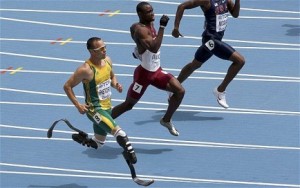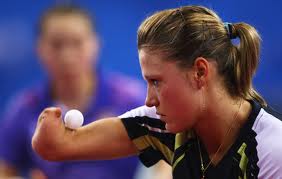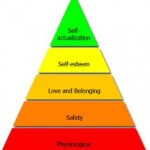Olympics, Disabilities and Inclusion
There are many legends around the origins of the Olympics. But the main idea was countries and individuals would meet every 4 years and set aside conflicts–and this shared experience would lead toward greater understanding and fewer conflicts.
Many believe the ancient Olympic games began with a foot race.
The 2012 Olympics were held in London, England. And, a footrace is not so simple. It turns out, the definition of a “foot” became a source of controversy.
Even with later personal tragedy, The Olympics story of Oscar Pistorius from South Africa is an inspirational lesson about the inclusion of people with disabilities.
Check out this video, “The fastest man with no legs” who uses his “blade runners” to race in the finals of the Olympics.
Yes, he races in the segregated Paralympics, but also in the inclusive regular Olympics.
This is an example of inclusion, self-advocacy, the power of a supportive family and an exceptional adult with disabilities.
I think this is also an excellent example of what the Olympic Spirit is all about. The Greek founders might never have envisioned this sort of story, but I’ll bet they were cheering up on Mount Olympus as Oscar became one of the fastest runners in the world.
“Unfair Advantage?”
If you have feet, you have tendons and muscles which give a “spring” to your step.
If you don’t have feet, you … what—sit at home? OR…
You have the choice of a segregated Special Olympics or a Parolympics event.
As Dennis Burger says, “I always think it’s ironic when officials claim an unfair advantage by a guy with a prosthetic device. Go Oscar!”
Go Natalia!
Lessons from the Olympics
Why is it that those of us who would never spend 10 seconds playing or watching ping pong, or skeet shooting, or footraces… voluntarily devote our precious time to these events on TV?
Why is it we choose to root for one team or one person?
With all the important events happening in the world, why would the evening news start out with the country’s Olympic medal count?
What is the magic that draws our attention?
I think the answer has to do with the concepts of “Us” and “Them.” The answer is rooted in our deep psychological need to belong.
We can wonder about the concepts of nationalism but like it or not, we are part of a tribe, a nation, we are part of “Us.”
And when the collected ego of our nation wins, we win.
So we say, “Go USA” or “Go England” or “Go Canada” when we really don’t care one bit about archery or who can do the backstroke.
In Maslow’s famous “hierarchy of needs” belonging and having people who care about you is critical to survival–more important than how many skills you have or self-actualization. Sometimes this means being part of a tribe, sometimes being part of a family, sometimes part of a church, school or … nation.
Or, sometimes sharing a bond with someone with a disability.
So when we hear about a runner who uses blades because he has no feet, or a woman who only has one hand and is a table tennis champion—suddenly we care about them.
We drop our nationalism and transfer all our goodwill to these courageous individuals because they have a disability and are part of our TEAM INCLUSION. We don’t know them personally, we aren’t a part of their country, but they are part of our heart.
They prove that all our daily advocacy efforts are worth it. That the dream of inclusion can be real.
They are changing the attitudes and social consciousness of a whole generation.
And it doesn’t matter if they are from South Africa, Poland, the US, or anywhere—they belong to us and our vision of an inclusive world.
Let’s see what new stories of inclusion will happen in 2024.
Keep Climbing: Onward and Upward
All my best,
Mary
Related Links:
See Aimee Mullen in a previous Olympics.
Do the Words “Disability” and “Handicapped” mean the same thing
Aaron’s Inclusion on the Junior High Track Team
—



